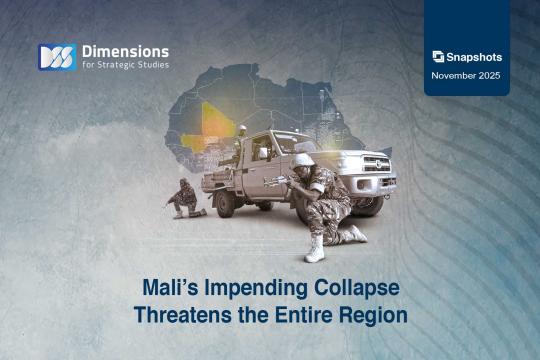
Turkey's Stance on Israel’s War on Gaza
2023-10-272812 view
In the early morning of October 7th, the Al-Qassam Brigades, Hamas' military arm, launched sweeping and surprise attacks on regions occupied by Israel. Hamas' sudden and rapid capture of multiple areas challenged long-held beliefs about Israeli military strength and disrupted the regional status quo. With the conflict escalating and Israel intensifying its offensive, world reactions were mixed. This article delves into Turkey's stance, which has become a hot topic of discussion in the Arab world.
Turkey's Policy Towards the Palestinian Issue:
Turkey's stance on Palestine is defined by a framework that's largely consistent regardless of the governing party. Central to this position is Turkey's advocacy for the creation of an independent Palestinian state with its capital in East Jerusalem, based on the pre-1967 borders, and gaining recognition from influential global entities. Even while pushing for Palestinian statehood, Ankara has always aimed to keep the lines of communication open with Tel Aviv, with Turkey being the first Islamic country to acknowledge Israel. Particularly in the '90s, when the Turkish military had a strong hand in shaping the country's policy, the military and security ties between Turkey and Israel were notably strengthened.
Although the attack by Israeli forces on the humanitarian aid vessel Mavi Marmara en route to Gaza in 2010 strained bilateral ties, both nations have since taken a pragmatic approach to mending their relationship. In recent years, efforts towards normalization have been evident, highlighted by meetings between Netanyahu and President Erdoğan in New York's Turkish House.
October 7th Operations and the Turkish Rhetoric:
It can certainly be said that Israel's assaults on Gaza after October 7th have strained the bilateral ties between Israel and Turkey. Through various officials, Turkey has voiced that these attacks should cease immediately. High-profile political figures, including President Erdoğan and Foreign Minister Hakan Fidan, have labeled Israel's actions in Gaza as genocidal, with Netanyahu accused of committing war crimes. Moreover, Turkish authorities have called for Israel to face international legal proceedings for intentionally targeting civilian areas like hospitals, refugee camps, and schools.
Reviewing Turkey's discourse and declarations post-October 7th, it's evident that Erdoğan has cast significant blame on the international community, notably the United States and European nations, for their steadfast backing of Israel. President Erdoğan has suggested that a rapid ceasefire is the most sensible solution for regional peace. In assessing Turkey's position, it appears that Ankara is striving to craft a reasonable political reaction; however, in Arab circles, this approach has been perceived as somewhat lackluster given the scale of the events, leading to criticism.
Turkish Political Rhetoric Intensifies Alongside Escalating Attacks:
As Israeli offensives intensified, Turkey's statements grew increasingly vehement. Erdoğan remarked that Israel doesn't act like a sovereign nation and thus won't be treated as one. Following an assault on a medical facility, Erdoğan, addressing the Justice and Development Party, asserted that Hamas is not a terrorist group but fighters protecting their homeland. In the wake of the October 7th assaults, Turkey's approach became more hardline with each passing day. Initially, Turkish officials who had offered comparatively softer remarks adopted a tougher stance in their language as a reaction to the unrelenting Israeli aggression. This shift from a somewhat reserved posture to a more robust reaction to the escalating breaches can be seen as a manifestation of Erdoğan's new diplomatic strategy, which prioritizes easing tensions with a range of global actors.
Turkey's relations have been tense with several key regional actors like Egypt, Saudi Arabia, and the UAE in the wake of the Arab Spring. The country had also scaled back its diplomatic engagement with Israel to the minimum level of a chargé d'affaires after the Mavi Marmara incident. Yet, as regional dynamics shifted and normalization with the aforementioned countries began, Turkey moved away from its post-2010 policy approaches. Turkey has thus adopted a more pragmatic stance, prioritizing long-term strategic interests. Consequently, many analysts have observed that Turkey's response to Israel has been understandably muted. Maintaining its proactive stance, Turkey is navigating the regional changes with a careful and realistic policy to avoid ending up on the losing side of regional transformations.
Adopting this stance has led to criticism of Turkey from Gaza and the broader Middle East. People in these regions had expected Turkey to take a stronger stand against Israel. After October 7, there was an expectation for Turkey to show clear support for the Palestinian resistance. Thus, the initially moderate tone of Turkey's rhetoric fell short of expectations in the Arab world.
The media reflected sentiments that Turkey should supply its drones to resistance factions, specifically naming companies like Baykar. However, such a step would need to go through official legal and diplomatic routes, potentially requiring a request from Palestinian Authority President Mahmoud Abbas—a scenario that seems unlikely and impractical, especially as some factions within the Turkish opposition view Hamas as a terrorist organization.
However, three notable Turkish positions can be observed.
Three Noteworthy Turkish Positions:
The Turkish Grand National Assembly issued a unanimous declaration condemning Israel and urging an end to the hostilities. Additionally, there were plans for a Turkish parliamentary delegation to visit Palestine.
President Erdoğan has incrementally hardened his stance against Israel, culminating in the cancellation of his planned visit to the nation. Amidst a wave of normalization between Israel and several Arab countries, Turkey has chosen to distance itself from Israel despite a recent period of warming ties, signaling Ankara's alignment with the Palestinian issue.
A third notable initiative Turkey has embarked upon is a sustained educational and media campaign to highlight the Israeli occupation. This effort spans across civil society initiatives and media coverage. Since October 7, the Palestinian cause has dominated the airwaves on Turkish media, with both government-supportive and opposition channels extensively covering the issue and experts analyzing potential responses to the Israeli occupation. NGOs across various ideologies and sects have also been actively organizing demonstrations, sit-ins, and embassy protests. Despite forceful crackdowns by the police on protesters, the Turkish public's opposition to Israel remains robustly visible. Additionally, a targeted boycott was launched against companies and institutions seen as supportive of Israel.
Turkey's increasingly firm position towards Israel is likely to persist if the assaults on Gaza do not cease. Devlet Bahçeli, who heads the Nationalist Movement Party allied with the ruling Justice and Development Party, has publicly stated that it is the responsibility of Turkish forces to defend Gaza. This indicates that Turkey may consider adopting more decisive measures against Israel. There's also been talk about Turkey possibly putting a hold on its collaborations with Israel in sectors like energy and economics, among others. However, Turkish responses have so far been limited to political denouncements and have not yet escalated to a point where they significantly alter the Turkish-Israeli relations.
If Israel launches a ground offensive in Gaza alongside increased targeting of civilians, Turkey may escalate its response, potentially taking tougher diplomatic, military, political, and economic actions. However, it's expected that Turkey would still strive to balance its ties with different Palestinian and Israeli groups, and continue to push for a ceasefire, which aligns with a core stance of Turkish foreign policy.





